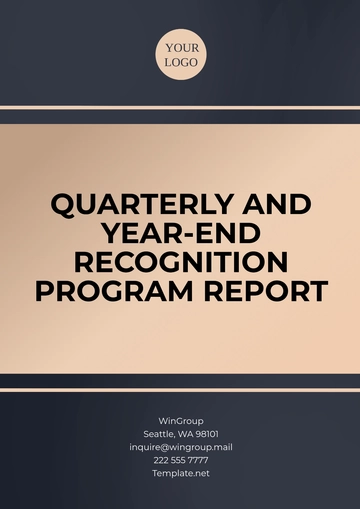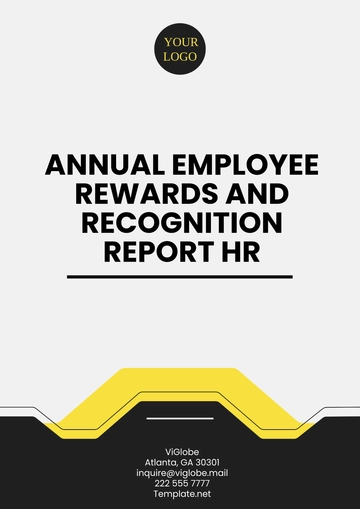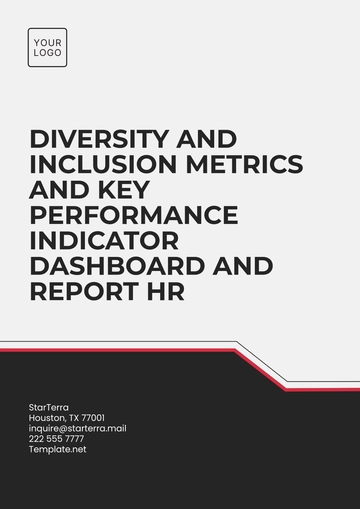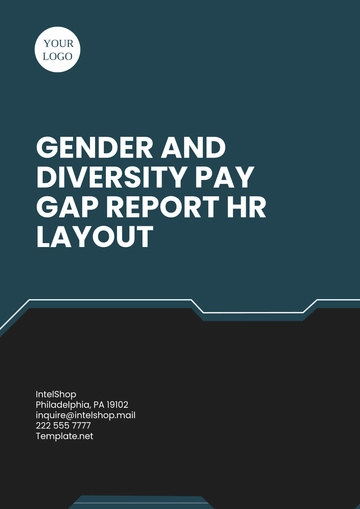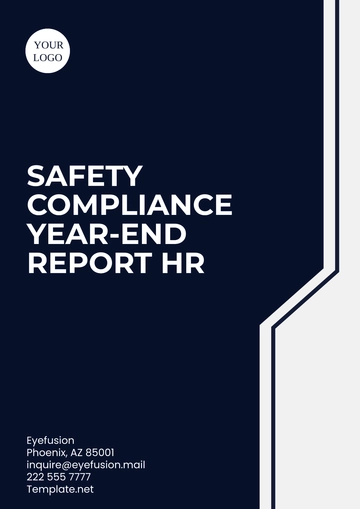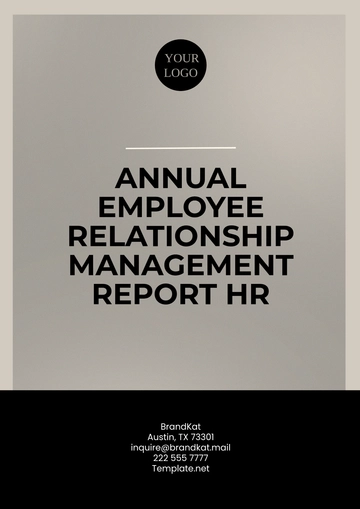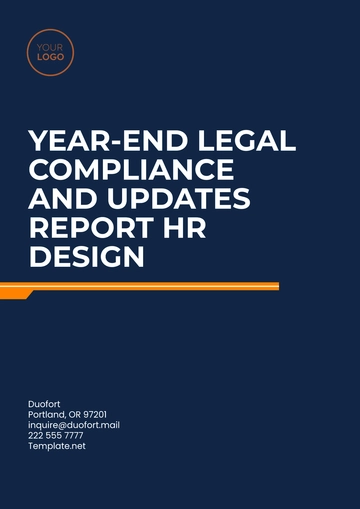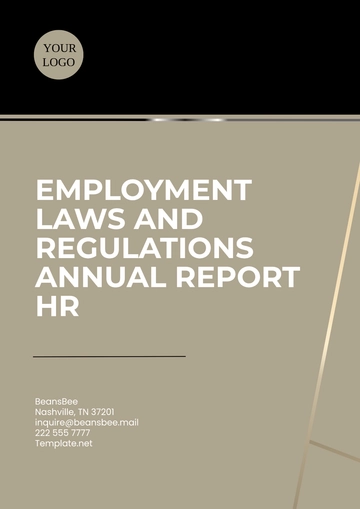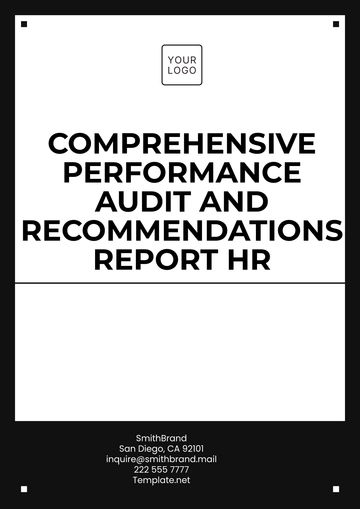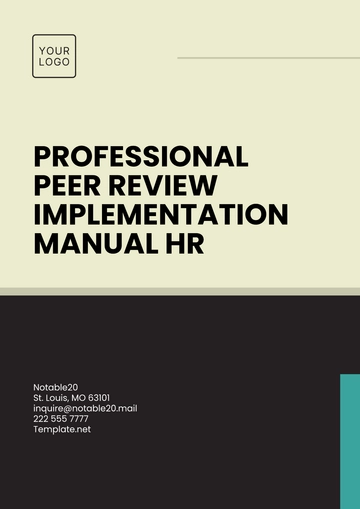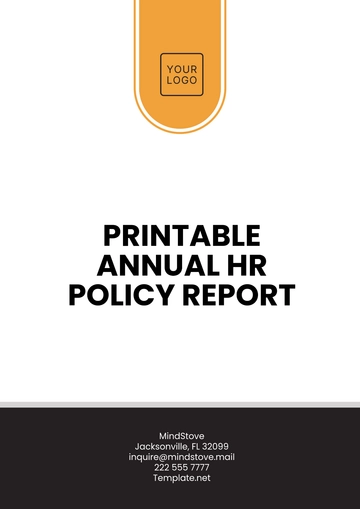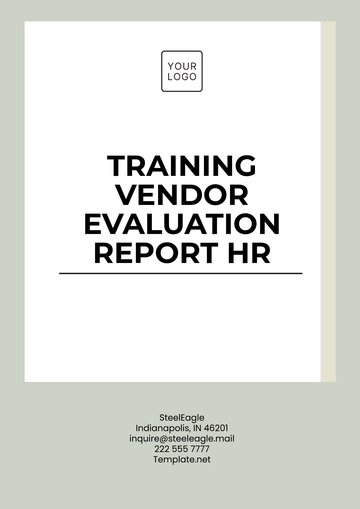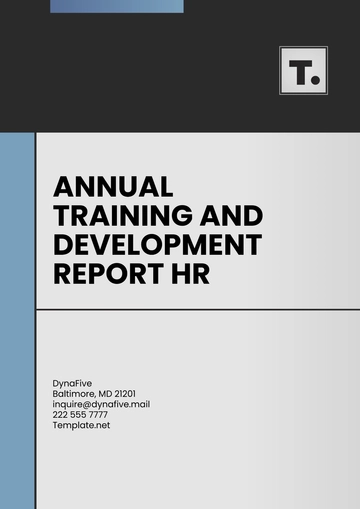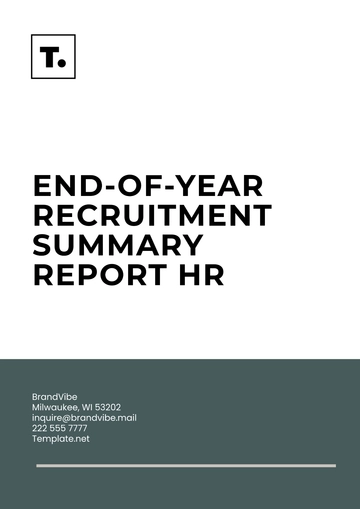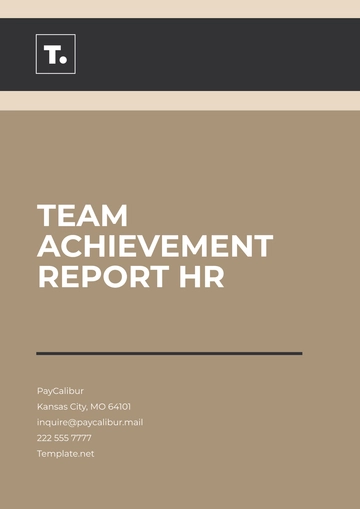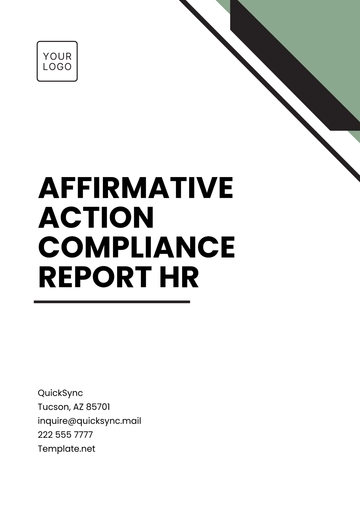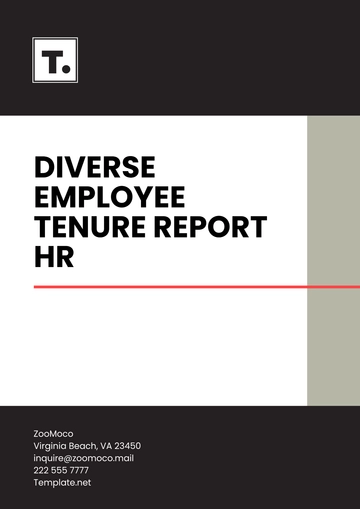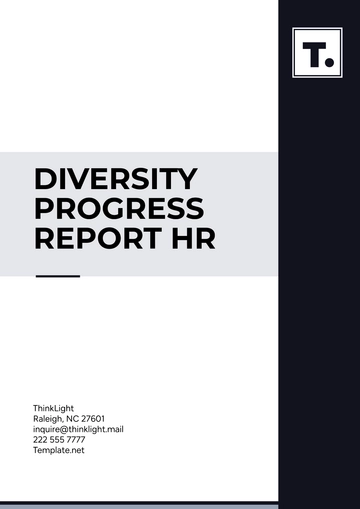Free Diversity Community Engagement Report HR
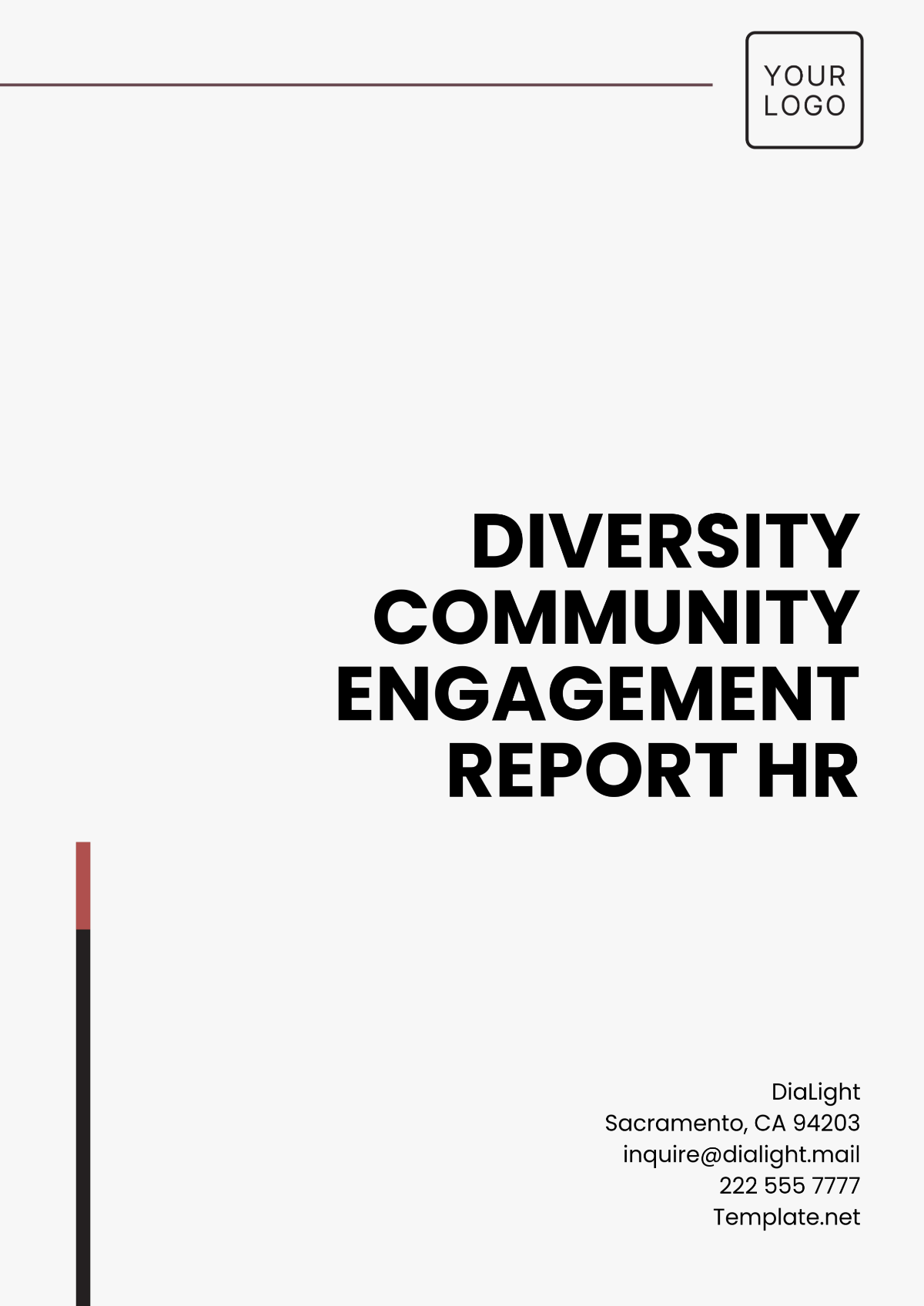
Prepared by: [Your Name]
Company: [Your Company Name]
Date: [Insert Date]
Introduction
The objective of this report is to evaluate and present an analysis of the current diversity community engagement initiatives within the HR department. This report aims to highlight the progress made, identify areas of improvement, and propose recommendations for enhancing diversity and inclusion within the organization's community engagement efforts.
Current Diversity Initiatives
The organization has implemented several initiatives to promote diversity and community engagement. These initiatives are designed to foster an inclusive environment and ensure equal opportunities for all employees.
Employee Resource Groups (ERGs)
Employee Resource Groups are voluntary, employee-led groups that aim to foster a diverse, inclusive workplace. ERGs are formed around shared characteristics or life experiences, such as gender, ethnicity, or sexual orientation.
Women in Leadership
LGBTQ+ Alliance
African American Network
Veterans Resource Group
Multicultural Mentorship Program
Diversity Training Programs
The HR department offers various training programs to educate employees about diversity and inclusion. These programs are aimed at raising awareness, combating biases, and promoting cultural competency.
Implicit Bias Workshops
Cultural Competency Training
Inclusive Leadership Development
Gender Sensitivity Training
Recruitment and Hiring Strategies
To ensure a diverse applicant pool, the HR department has adopted inclusive recruitment and hiring practices. These strategies are focused on attracting and retaining talent from various backgrounds.
Partnerships with diverse professional organizations
Blind recruitment processes
Diverse interview panels
Internship programs targeting underrepresented groups
Engagement Metrics and Analysis
To evaluate the effectiveness of diversity initiatives, various key performance indicators (KPIs) and metrics are used. Analyzing these metrics helps measure progress and identify trends and areas for improvement.
KPI | 2050 | 2051 |
|---|---|---|
Percentage of Diversity Hires | 25% | 30% |
Employee Satisfaction Score | 78 | 82 |
Retention Rate of Diverse Employees | 85% | 87% |
Participation in ERGs | 914 | 1023 |
Challenges and Areas for Improvement
Despite the positive outcomes achieved so far, certain challenges remain in effectively engaging a diverse community. Addressing these challenges is essential to further success.
Underrepresentation in Leadership
There remains a significant gap in the representation of diverse employees in leadership positions. Increasing pathways to leadership for underrepresented groups is crucial for equitable advancement opportunities.
Bias and Discrimination
Biases and workplace discrimination, subtle or explicit, remain a barrier to developing a truly inclusive environment. Continuous training and a firm stance from leadership are necessary to address this issue.
Engagement Fatigue
Some employees report feeling fatigued or overwhelmed by the numerous diversity initiatives and training sessions. Balancing these initiatives with other work responsibilities can be a challenge.
Recommendations
Based on the analysis of the current initiatives and identified challenges, several recommendations are proposed to improve diversity community engagement.
Leadership Development for Diverse Employees
Create targeted leadership development programs that prepare diverse employees for advancement opportunities. These programs should include mentorship, training, and networking opportunities.
Enhanced Bias Training
Implement more comprehensive and continuous bias training to ensure employees recognize and address unconscious biases. Encourage open dialogues about biases and discrimination within the workplace.
Simplified Engagement Programs
Streamline diversity initiatives to focus on quality over quantity. Ensure programs are impactful without overwhelming employees, by prioritizing key initiatives and allowing flexibility in participation.
Conclusion
In summary, the organization's diversity community engagement efforts have resulted in positive outcomes, with room for further growth and improvement. By addressing current challenges and implementing the proposed recommendations, the organization can enhance its commitment to diversity and inclusion, and foster a more inclusive and equitable workplace for all employees.
- 100% Customizable, free editor
- Access 1 Million+ Templates, photo’s & graphics
- Download or share as a template
- Click and replace photos, graphics, text, backgrounds
- Resize, crop, AI write & more
- Access advanced editor
Showcase your commitment to diversity with Template.net's Diversity Community Engagement Report HR Template. Fully customizable and editable in our Ai Editor Tool, this template helps you document and highlight your community engagement efforts. Communicate your achievements and foster stronger community ties through transparent reporting and dedicated action.
You may also like
- Sales Report
- Daily Report
- Project Report
- Business Report
- Weekly Report
- Incident Report
- Annual Report
- Report Layout
- Report Design
- Progress Report
- Marketing Report
- Company Report
- Monthly Report
- Audit Report
- Status Report
- School Report
- Reports Hr
- Management Report
- Project Status Report
- Handover Report
- Health And Safety Report
- Restaurant Report
- Construction Report
- Research Report
- Evaluation Report
- Investigation Report
- Employee Report
- Advertising Report
- Weekly Status Report
- Project Management Report
- Finance Report
- Service Report
- Technical Report
- Meeting Report
- Quarterly Report
- Inspection Report
- Medical Report
- Test Report
- Summary Report
- Inventory Report
- Valuation Report
- Operations Report
- Payroll Report
- Training Report
- Job Report
- Case Report
- Performance Report
- Board Report
- Internal Audit Report
- Student Report
- Monthly Management Report
- Small Business Report
- Accident Report
- Call Center Report
- Activity Report
- IT and Software Report
- Internship Report
- Visit Report
- Product Report
- Book Report
- Property Report
- Recruitment Report
- University Report
- Event Report
- SEO Report
- Conference Report
- Narrative Report
- Nursing Home Report
- Preschool Report
- Call Report
- Customer Report
- Employee Incident Report
- Accomplishment Report
- Social Media Report
- Work From Home Report
- Security Report
- Damage Report
- Quality Report
- Internal Report
- Nurse Report
- Real Estate Report
- Hotel Report
- Equipment Report
- Credit Report
- Field Report
- Non Profit Report
- Maintenance Report
- News Report
- Survey Report
- Executive Report
- Law Firm Report
- Advertising Agency Report
- Interior Design Report
- Travel Agency Report
- Stock Report
- Salon Report
- Bug Report
- Workplace Report
- Action Report
- Investor Report
- Cleaning Services Report
- Consulting Report
- Freelancer Report
- Site Visit Report
- Trip Report
- Classroom Observation Report
- Vehicle Report
- Final Report
- Software Report


